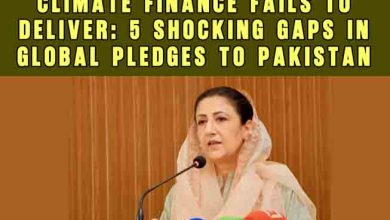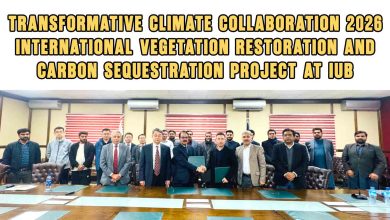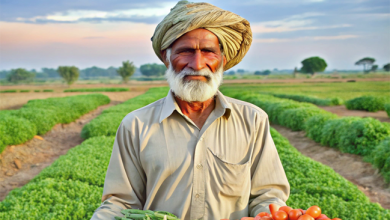Pakistan Demands Fairness in Global Plastic Treaty Talks: 5 Urgent Reforms for a Just Future
Pakistan demands fairness in global plastic treaty talks, calling for urgent reforms to protect developing nations from the burden of imported waste.
Unfolding Tragedy: Pakistan’s Deadly Floods
The Pakistan Climate Crisis has taken a deadly turn in 2025. Torrential monsoon rains have triggered widespread floods, washing away homes, damaging farmland, and displacing thousands. The National Disaster Management Authority (NDMA) confirms 32 deaths, with rescue operations still underway.
This year’s flooding echoes the catastrophic 2022 floods, which submerged one-third of Pakistan, affected 33 million people, and caused over $14.8 billion in economic losses. Despite global attention at the time, most promised aid never reached those in need.
Glacier Melting and Rising Heat: An Escalating Threat
Pakistan hosts over 13,000 glaciers, the largest number outside the polar regions. Rising global temperatures are causing accelerated glacial melt, leading to glacial lake outburst floods (GLOFs) that threaten mountain communities.
The Pakistan Meteorological Department reports that the country’s average temperature has already risen by 1.1°C, resulting in more heatwaves, crop failures, and extreme rainfall events. These climate shifts amplify the risk of disasters, hitting rural and poor communities the hardest.
Climate Injustice: Pakistan Pays for Others’ Emissions
Climate Change Minister Musadiq Malik emphasizes that Pakistan’s crisis is not only environmental but also deeply moral. Despite contributing less than 1% to global greenhouse gas emissions, Pakistan suffers disproportionately from the impacts.
Wealthier nations, which are historically responsible for the climate emergency, still receive the bulk of green financing, leaving vulnerable nations like Pakistan underfunded. This lopsided allocation highlights the stark inequality in climate responsibility versus climate suffering.
External Link : Learn more about global climate justice from the UN
Weak Healthcare and Disaster Systems
According to Amnesty International, Pakistan’s limited healthcare capacity and inadequate disaster preparedness leave millions exposed during extreme events.
-
Rural hospitals often lack basic emergency supplies.
-
Flood-affected areas face outbreaks of waterborne diseases.
-
Vulnerable groups, including children and elderly people, face the highest mortality rates during floods.
Without urgent investment in resilient healthcare infrastructure, Pakistan will continue to see high casualties even from disasters that could be mitigated.
Moral Failure of Global Climate Financing
Global leaders have pledged billions in climate aid, but disbursement gaps remain a critical issue. Many funds are tied to loan conditions, pushing already debt-strapped countries into further financial hardship.
Musadiq Malik calls this a “crisis of injustice”, stressing that wealthy polluters should shoulder a greater share of the adaptation and recovery costs for nations like Pakistan.
Urgent Call for Fair Climate Action
Pakistan’s situation underscores the urgent need for:
-
Fair Climate Financing – Equitable distribution of funds based on vulnerability, not political leverage.
-
Debt Relief for Climate Victims – Allow disaster-hit nations to focus on recovery, not repayment.
-
Regional Cooperation – Joint South Asian initiatives to manage water resources, glaciers, and monsoon forecasting.
-
Early Warning Systems – Expanding meteorological networks to predict and respond to extreme events faster.
Internal Link : Read our report on South Asia’s water security challenges
Conclusion: A Shared Global Responsibility
The Pakistan Climate Crisis is more than a local or regional problem—it’s a warning to the world. If global emissions remain unchecked and climate financing continues to favor the wealthy, disasters like these will become the new normal.
Pakistan’s floods remind us that climate change is not an equal-opportunity disaster. The burden falls most heavily on those who contributed the least to its cause. Addressing this injustice requires immediate global cooperation, transparent funding mechanisms, and a genuine commitment to a shared sustainable future.







